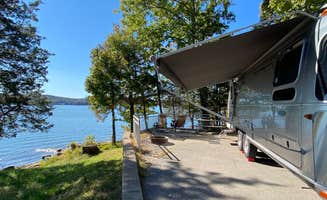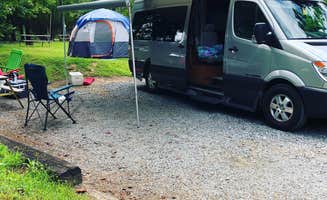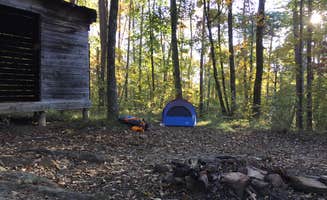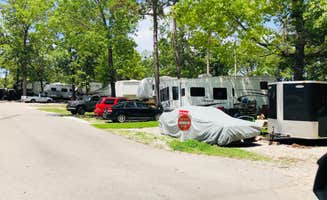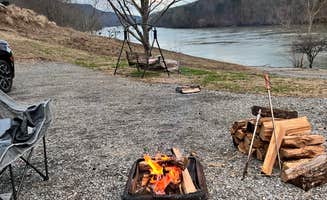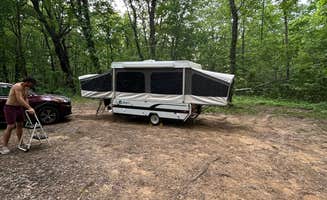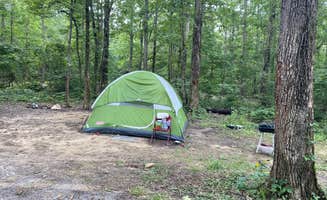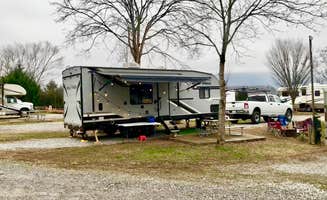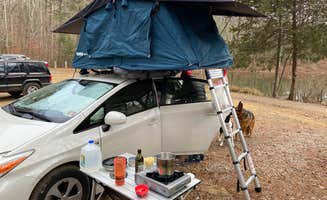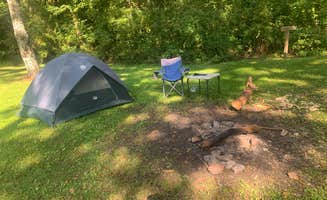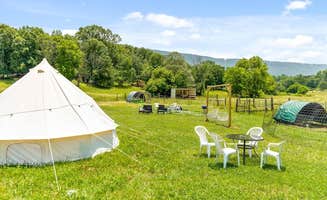Camping sites near Harrison, Tennessee center on the Tennessee River system with elevations between 670-800 feet and moderate humidity levels year-round. The region experiences typical southeastern seasonal patterns with summer highs in the 90s and winter lows occasionally below freezing. Some campgrounds close during winter months while others operate with reduced facilities from November through March.
What to do
Hiking along scenic trails: Cloudland Canyon State Park Campground offers extensive hiking opportunities with varying difficulty levels. "One of my favorite campgrounds in Georgia is at Cloudland Canyon State Park. A small hike from the parking area, there's plenty of space in these woods for a quaint and quiet stay," notes one visitor who found the backcountry areas particularly appealing.
Cave exploration: Raccoon Mountain Caverns and Campground provides unique underground adventures. "The caverns were pretty cool. Having the dog park close by was a bonus," mentions a camper. The cave tours require advance reservations and proper footwear, with standard tours lasting approximately 45 minutes.
Fishing in stocked waters: Many campers report successful fishing at multiple locations, particularly at Skull Island, where one camper noted, "My husband caught several large mouth bass in the pond too (catch and release)." The island setup creates multiple shoreline fishing spots accessible directly from campsites.
What campers like
Waterfront camping access: Sites directly on the water remain the most requested feature. At Chester Frost Park, campers appreciate the lake proximity: "Love staying on the lake front and watching the sun set." The park's layout places many sites within 50 feet of the shoreline.
Air-conditioned bathhouses: During hot summer months, climate-controlled facilities make a significant difference. One camper specifically noted: "Spacious sites in D. AC bath houses!" referring to a section at Harrison Bay State Park. Several campgrounds have updated their facilities to include individual air-conditioned bathroom units rather than traditional shared facilities.
Dog-friendly accommodations: Most campgrounds welcome pets with specific amenities. "The campground was clean and the people working were very friendly. The sites are very close together so there is not much room to move around or have pets outside," notes a visitor to Chattanooga North-Cleveland KOA, highlighting both the benefits and limitations for pet owners.
What you should know
Campsite drainage issues: After rainfall, several campgrounds experience standing water problems. "Would most likely stay again, but would ask for a site with no standing water. Major drainage problem," reported a camper at Holiday Travel Park, noting many sites had water pooling for days after storms.
Seasonal closures and limitations: Check operating schedules before planning. At Prentice Cooper State Forest Dispersed, "This is a beautiful WMA area with tons of offshoots along a service road for camping, but please note, 99% of areas are closed between December and March," warns a visitor who had to find alternative accommodations.
Wildlife management considerations: Several campgrounds report active wildlife that requires proper food storage. "Kind of tough time to enforce and they are having a good time," remarked a camper at Raccoon Mountain about children running around closed playgrounds during Covid restrictions, showing how rule enforcement varies by location and season.
Tips for camping with families
Playground proximity selection: When booking sites, check for playground adjacent locations. A visitor to Chester Frost Park enthused: "This place is definitely somewhere you wanna bring your kids they would love it! There is a man made beach with a playground and loads of camping lots next to the river!"
Swimming options for children: Fall Creek Falls State Park Campground provides exceptional water recreation according to campers: "Make sure you do three things while you're there: hike to the bottom of the big waterfall (Fall Creek Falls), swim in the cascades next to the nature center, and stand on the edge of the bluff at Buzzard's Roost."
Site space for activities: Request larger sites when traveling with children. "Sites 4-9 are well spaced from each other and great for tent campers and families who want their kids to have room to play," noted a Cloudland Canyon visitor, highlighting the importance of selecting appropriate locations rather than just any available site.
Tips from RVers
Level site challenges: Many campgrounds have uneven terrain requiring preparation. A visitor to Holiday Travel Park reported: "Site 212 sold to us as a deluxe site, at $62/night, which we found no evidence of anything deluxe at our site or in the campground. Site 212 pull-thru was not long enough to keep our tow vehicle connected to our 27ft trailer."
Utility placement considerations: Check hookup locations before arrival. "It was very easy to pull in and utilities were nicely placed in the middle of the pad. The water pressure was good and they have a nice selection of cable channels," noted a camper at Holiday Travel Park, demonstrating the variability of utility setup even within the same campground.
Site selection for size: Big rigs require careful site selection. "We have a 40' class A and flat tow a Jeep. We stayed in site 203 for 3 nights. While we really enjoyed the campground, this site was not ideal for an RV our size. We weren't able to put our awnings out or comfortably sit outside," cautioned a visitor to Raccoon Mountain.


